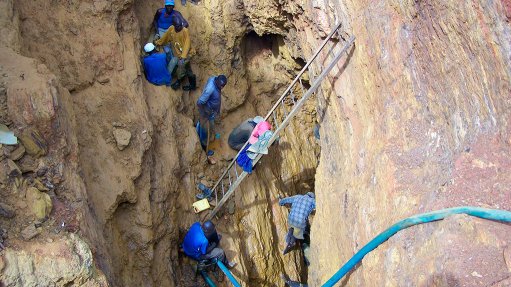
CLUSTERED AND FORMALISED Small operations could be clustered together geographically and assigned an engineer, a geologist and a health and safety officer to ensure safe operations
With industrial mining on the decline, smaller- to medium-scale mining operations “are the future”, states Bench Marks Foundation South Africa lead researcher David van Wyk.
Addressing delegates at the Science Business Society Dialogue Conference on Linking Science, Society, Business and Policy for the Sustainable Use of Abandoned Mines in the Southern African Development Community, in Johannesburg, last month, Van Wyk added that, as the formal mining declined, informal mining would increase. However, he highlighted the need for the “orderly, sensible and safe” transition from large-scale, industrial mining to small-scale mining.
In his presentation, titled ‘The Legacy of Mining: Perspectives on Past Practices and Future Options – A community-centred view from South Africa’, Van Wyk noted that about 36 000 were involved in small-scale mining in the Johannesburg area, while about 400 000 depended on this type of mining, according to the Bench Marks Foundation’s calculations.
As part of his solution for a smooth transition from large- to small-scale mining, Van Wyk suggested that zamas zamas be organised into small legal business entities as cooperatives.
These cooperatives should be supported financially by the State and should be provided with the required education and training to execute activities safer. This support could be done through the mining sector education and training fund, Van Wyk posited.
He further suggested that small operations be clustered together geographically, and for each cluster to be assigned an engineer, a geologist and a health and safety officer to ensure safe operations.
Van Wyk added that the Bench Marks Foundation wanted to create an independent fund from which communities could draw to employ their own environmental experts and health and safety officers, as well as geologists, and for them “ . . . to sit with the large mining corporations and speak from the same level of knowledge and information as . . . these corporations”.
Other solutions to ensure a smooth transition from large- to small-scale mining include the establishment of a central buying agency on the demand side, which would sell to the State and buy all the gold from the small-scale operations at market value. This could, in turn, eliminate the gangs and syndicates that “take” the gold, Van Wyk said.
Further, there should be regular health and safety inspections at these operations.
“We believe that formal supply chains should be created around these small operations and that nearby communities should be involved in these supply chains, so that there is a ripple effect from them [and small enterprise development],” he noted, adding that small-scale mining was the freest market economy in South Africa, as it was not monopolised or concentrated.
Van Wyk warned, however, that, if small- scale and informal mining was not regulated and brought under control, “South Africa will turn into the Democratic Republic of Congo, where it will lead to war and conflict over minerals and South Africa will move quickly to an utterly failed State”.
“It is essential that we pay attention to this,” he stressed.